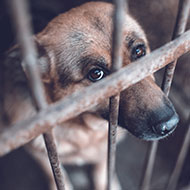
New legislation will see stricter sentencing for animal welfare offences
On Thursday 11 March Scottish MPs voted unanimously to support the general principles of the Animal and Wildlife (Penalties, Protections and Powers) (Scotland) Bill at Stage one.
The Bill aims to strengthen animal welfare measures by:
- increasing penalties for serious animal cruelty and wildlife offences to five years imprisonment and a possible unlimited fine
- allowing enforcement agencies to rehome animals without a court order
- implementing Finn’s Law to provide better protections for service animals
- introducing powers to allow fixed-penalty notice regimes.
It will also standardise wildlife crime penalties – aligning penalties for 22 serious offences, which involve the killing or injuring of wild animals, with the new maximum penalties for animal welfare offences.
Rural affairs minister Mairi Gougeon said the Bill “will modernise and strengthen the implementation of existing legislation impacting on animal welfare, assisting enforcement authorities to ensure that Scotland’s domestic animals and wildlife benefit from the best possible protection.”
She added: “Although the most extreme [animal cruelty] cases are rare, as a society and as a Government, we need to send the strong message that any animal cruelty or wildlife crime shall not be tolerated. I hope that the publicity around the bill will start the necessary behaviour changes to banish that cruelty from our society.
“These often traumatic and sadistic offences rightly attract considerable public concern. We are also concerned about links to serious organised crime in some other cases, particularly those to do with the illegal trade in puppies.
“We consider – and others agree – that the current maximum penalties are simply not high enough to allow the courts to deal appropriately with such cases.”



 The latest
The latest